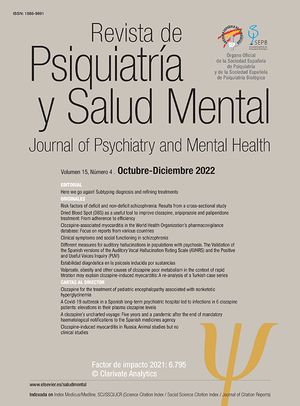Clinical simulation (CS) is a healthcare-oriented learning methodology that allows to experience a representation of a real healthcare event to practice, evaluate, and reflect on the actions taken while bridging the gap between theoretical education and real practice with patients. Its use as a training tool for healthcare professionals has exponentially increased in recent years, proving its effectiveness in learning to make clinical decisions, acquiring technical skills, and working as a team without putting patients and professionals at risk.1 Despite the evidence demonstrating the effectiveness and the added-value in terms of learning quality of CS on other medical specialties, its use for postgraduate training in psychiatry is limited. However, CS for the training of technical and non-technical skills in psychiatry residents and specialists is still scarce.2
The published works on CS concerning mental health include techniques such as role-play, virtual reality, standardized patients with actors to practice clinical scenarios, communication or psychotherapeutic skills, the use of voice simulators for the training with schizophrenia-diagnosed patients and the use of mannequins for the practice of techniques such as electroconvulsive therapy (ECT). Importantly, CS will not be effective unless it is accompanied by an assessment and supervision method. It is of note that, in the majority of the published works, there is a lack of feedback or debriefing following CS. Furtherly, we found no descriptions of complex and changing scenarios such as those usually found by mental health professionals either on emergency settings or in routine clinical care.3
On our view, an appropriate CS in psychiatry should include three different phases: Firstly, a prebriefing phase comprising the creation of a stimulating and participatory work environment. Secondly, a briefing phase for the development of a simulated scenario that evokes or replicates the core features of the real-world clinical setting, as the purpose of this second phase is to let participants to face to the proposed learning challenge under the most similar conditions regarding real-world clinical practice. Thirdly, a debriefing phase, which represents the essential piece of this learning method. Debriefing is defined as a conversation between the participants, CS instructors and other observers to review a real or simulated event, in which participants analyze their actions and reveal on the role of thinking processes, psychomotor skills and emotional states to improve or maintain their performance in the future.4 In psychiatry, compared to other specialties, it is relatively easy to recreate clinical scenarios to achieve realism and a real-time changing clinical environment. Nonetheless, for the full immersion of the CS participants in the scenarios, there are some key items which are critical to fulfill and make work together. The first item would be the work of CS-trained instructors to foster an engaging learning environment based on a learning philosophy inspired on “good judgment” that combines high clinical standards with high regard for participants. Good judgment follows the principle that all of the participants on CS activities are smart, capable, and concerned with own-guided-self-improvement related to working skills. In second place, a realistic designed learning stage. This should include a stage that faithfully mirrors the real-world clinical scenario which inspired the case for simulation. Thirdly, it is important to count with a staff of trained actors who had previously worked with a script which has to serve as a basis for improvising and offering realistic reactions according to those expected in real-world conditions. Eventually, after the simulated scenario, CS-trained instructors will play a key role again acting as facilitators for a fluent and learning-focused debriefing phase. Thus, the design and development of a CS course in Psychiatry has to be ruled, preferably, by psychiatrists with accredited training in CS and the development of these activities should take place on the facilities of an accredited center for medical simulation.5
An important aim for the future would be to build a structured CS training program for psychiatry residents and also for junior or senior psychiatrists who want to update or continue their training following this innovative methodology. Critically, this sort of project has to be accompanied by an assessment of the short and medium-term impact of CS training programs on real changes into clinical practice. A second aim, would consist on applying CS in psychiatry as a training and teaching tool for medical students, general physicians, nurses, and other specialties’ residents and specialists who work directly or indirectly with patients diagnosed with mental illness as a pathway leading to better treatment and management of our patients as well as a potential drive to change the stigma that accompanies our specialty and our patients.6 Psychiatry has demonstrated impressive advances on research, novel treatments and approaches along the last decades that set the specialty among the avant-garde disciplines of modern Medicine. Innovative training and education methods on psychiatry should follow this upgrade and growth era for this medical specialty.
Conflict of interestThe authors declare that they have no competing financial interests or personal relationships that could have influenced the work reported in this paper.







